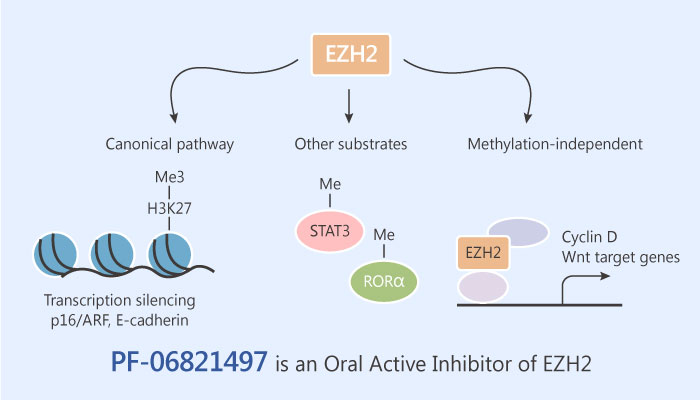Epigenetic alterations are a recognized hallmark of cancer cells, and several lines of evidence link aberrant EZH2 (Enhancer of Zeste Homolog 2) activity to tumor initiation and progression. EZH2 is also overexpressed in multiple solid tumors and hematological malignancies, and elevated expression is often correlated with disease progression and poor survival. A study from Pei-Pei Kung discovered and identified a novel EZH2 inhibitor. In general, PF-06821497 (compound 23a) is a potent, selective, and orally active Enhancer of Zeste Homolog 2 (EZH2) inhibitor, with a Ki value <0.1 nM against mutant Y641N EZH2. Importantly, PF-06821497 displayed superior LipE among all analogs synthesized in the lactam series. This superior LipE enabled the combination of excellent potency, sufficient metabolic stability, permeability, and solubility properties.

Firstly, the authors tested a number of lactam-derived EZH2 inhibitors. Among them, PF-06821497 (compound 23a) exhibited the best overlap of potency and pharmaceutical properties. Additionally, PF-06821497 as well as showed robust tumor growth inhibition in vivo.
In vivo, PF-06821497 (100 mg/kg, PO twice daily for 31 days) treatment results in significant inhibition of tumor growth. Additionally, the tumor regression effect can be sustained for another 40 days after the terminal administration in Mice bearing Karpas-422 DLBCL tumor xenografts (which contain the Y641N EZH2 mutation). Besides, PF-06821497 with a dose of 300 mg/kg has minimal impact on animal body weights.
To conclude, PF-06821497 has excellent anti-tumor activity, with safe pharmaceutical properties. These data enable the selection of compound 23a as a clinical development candidate.
Reference:
Kung PP, et al. J Med Chem. 2018 Feb 8;61(3):650-665.